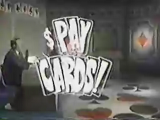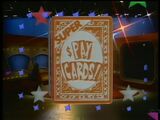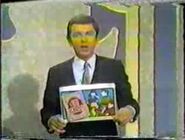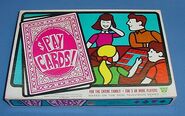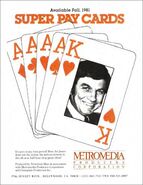(Removers link as that domain is no longer in service.) Tags: Visual edit Mobile edit Mobile web edit |
|||
| Line 112: | Line 112: | ||
*'''Seven-Card Stud''' – Mary Lou gave each player a choice of two sets of two cards to use and see for themselves, and place in front of their podium. The players used their own two cards with the five additional cards they wanted to keep. The two cards were not revealed to their opponent until they keep all five cards. |
*'''Seven-Card Stud''' – Mary Lou gave each player a choice of two sets of two cards to use and see for themselves, and place in front of their podium. The players used their own two cards with the five additional cards they wanted to keep. The two cards were not revealed to their opponent until they keep all five cards. |
||
* '''Strategy''' – Played with three cards being revealed (but not turned back as in the first round) at the start of the hand. The players would take two turns calling off cards (two each) and would pick two cards from the five cards then showing as to what they wanted in the hand. Each player on their third turn would call off one card and pick one card from the four displayed cards. |
* '''Strategy''' – Played with three cards being revealed (but not turned back as in the first round) at the start of the hand. The players would take two turns calling off cards (two each) and would pick two cards from the five cards then showing as to what they wanted in the hand. Each player on their third turn would call off one card and pick one card from the four displayed cards. |
||
| − | *'''Two-Three-Four-Five''' – One set of cards had a fifth duplicate in addition to two pairs, a three-of-a-kind set and a four-of-a-kind set. Each player may turn over two cards per turn (or one if he or she already had four cards). |
+ | *'''Two-Three-Four-Five''' – One set of cards had a fifth duplicate in addition to two pairs, a three-of-a-kind set and a four-of-a-kind set. Each player may turn over two cards per turn (or one if he or she already had four cards), but had the option of turning them back. |
===Wild Card Hand=== |
===Wild Card Hand=== |
||
Revision as of 22:54, 14 May 2022
| Host | |
| Art James | |
| Announcers (1968–1969 Version) | |
| Glenn Rhyle Fred Collins | |
| Hostess/Announcer (1981–1982 version) | |
| Mary Lou Basaraba | |
| Broadcast (Daily Syndication) | |
| Pay Cards!: 9/9/1968 – 9/5/1969Super Pay Cards!: 9/14/1981 – 3/12/1982 (with reruns through 9/10/1982) | |
| Packagers | |
| Nicholson-Muir Productions Taft Broadcasting Company (1968–1969) Champlain Productions (1981–1982) | |
| Distributor | |
| Metromedia Producers Corporation | |
1968-69 SPIEL:
"You're aces with everybody when you join us to play television's first card game: Pay Cards! And here's our trump card, the host who pays: Art James!"
1981-82 SPIEL:
"It's the television card game that everyone can play, (it's) Super Pay Cards! And here's your host, Art James!"
On (Super) Pay Cards!, contestants played poker using cards on a game board to make big poker hands and win cash.
Pay Cards! (1968–1969)
Three players, one of whom was a celebrity playing for a studio audience member, faced a board of 20 hidden cards and attempted to build a high poker hand.
Five Card Draw
In Rounds 1 and 3, the first player would call out three cards to reveal. If a pair or three of a kind came up, the player had to keep those cards. If not, the player could either keep the cards or turn them back. If the cards were kept, that player called out a fourth card. If the cards were refused, control passed to the next player in turn, who would then turn over three cards. If a player kept a card, that player could then turn over another card and either keep it or refuse it.
After two players had each completed a five-card hand, the remaining player had to complete his/her hand by keeping whichever cards s/he revealed.
At the end of each round, the players were paid as follows:
| Payout | Hand |
|---|---|
| $10 | Each Pair |
| $30 | Three of a Kind |
| $50 | Full House |
| $100 | Four of a Kind |
| $150 | Five of a Kind |
The player with the best hand at the end of each round received a $50 bonus. After the first round, Art asked one player to locate a specific card among the remaining five for $20.
Wild Card Round
This second round was played similarly to Round 1, but with a few Wild Cards" hidden on the board (each with a photo of the celebrity guest). These cards allowed for a player to make five-of-a-kind.
If time ran short, each player had to complete their hand immediately.
The player with the most money at the end of the game played the jackpot round.
Jackpot Game
The player would attempt to memorize 12 cards and their positions for 12 seconds. The celebrity guest would then spin a wheel, which determined which card the player had to locate on the board. If the player could recall where that particular card was located on the board, he or she would win a bonus prize.
Super Pay Cards! (1981–1982)
Two contestants (male vs. female) competed, facing a board of 16 playing cards and trying to build their best hand out of them.
Five Card Draw
The players were shown four cards at the start of the round and where they were located. After they were hidden again, the player in control called out three cards and tried to build the best possible five-card hand with them. If a pair or three of a kind was revealed, the player automatically kept it and tried to build on the hand.
After each card was revealed, the player could either keep the card and control, or refuse it and pass control. This continued until one of the players completed their five card hand, with the opponent having to make do with whatever cards they had called.
At the end of each round, players were paid off depending on what they had in their hand:
| Payout | Hand |
|---|---|
| $20 | Each Pair |
| $50 | Three of a Kind |
| $100 | Full House |
| $200 | Four of a Kind |
| $300 | Five of a Kind |
As in the original series, a $50 bonus was awarded to the better hand in the round.
If time was running short during a round and if neither player completed their hand, then both players were required to immediately complete their hand.
Round 2
Round 2 had four different formats
- Four-Of-A-Kind – Four sets of four-of-a-kind were on the board. It was possible for both players to receive $200 in this round. No free cards were shown at the start.
- Seven-Card Stud – Mary Lou gave each player a choice of two sets of two cards to use and see for themselves, and place in front of their podium. The players used their own two cards with the five additional cards they wanted to keep. The two cards were not revealed to their opponent until they keep all five cards.
- Strategy – Played with three cards being revealed (but not turned back as in the first round) at the start of the hand. The players would take two turns calling off cards (two each) and would pick two cards from the five cards then showing as to what they wanted in the hand. Each player on their third turn would call off one card and pick one card from the four displayed cards.
- Two-Three-Four-Five – One set of cards had a fifth duplicate in addition to two pairs, a three-of-a-kind set and a four-of-a-kind set. Each player may turn over two cards per turn (or one if he or she already had four cards), but had the option of turning them back.
Wild Card Hand
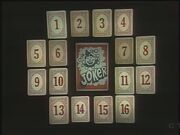
Round 3 was played similar to Round 1, but with one, two, or three Jokers shuffled into the cards to make five-of-a-kind possible.
At the end of this round, the player with more money won the game and advanced to the bonus round for a chance at $5,000. The losing player left with the cash in front of them as well as a copy of the show's home game. In the event of a tie, a playoff was held, in which both players chose cards from the remainder of the board (Aces are high) and the contestant that started Round 3 would pick first; with high card awarding $50 and the game.
In some cases, the winner ended up being determined before Round 3 due to being ahead by more than $350 after Round 2. In this event, Round 3 was played for additional money.
The maximum possible score was $950: $250 in Round 1, $350 in the Two-Three-Four-Five format of Round 2, and $350 in the Wild Card Hand.
Bonus Round
In the first phase of the bonus round, a player was given four cards to memorize and four seconds to do it with. They would then pick a card from Mary Lou and try to find where it was on the board. Doing so won $50.
The second phase involved eight cards and eight seconds of memorization time. Success here increased the player's winnings to $500.
If a player got to the third and final phase, they faced a 12-card board. After having twelve seconds to memorize the cards, they'd make one final choice of card. Correctly recalling its location won the contestant the top prize of $5,000.
If the player made a mistake during one of the first two levels, the player lost the chance to win the $5,000, but could play that stage again. A wrong guess on the third level meant that the contestant lost the $5,000, but kept the $500 for success on the first two levels.
The series had no returning champions.
Merchandise
A board game was produced by Whitman Publishing in 1969. Gameplay was modified in that all three opening rounds were played in "Five Card Draw" format (although with a little tweaking, the game could be played to the TV rules for either version), and all players participated in the Jackpot Round to try and find the chosen card.
Two versions of the game were released, with the first one having no Wild Cards and the second including two (though the rules of the latter version prohibit Wild Cards from being used to make five-of-a-kind).
Super Pay Cards! promoted a board game on-air (as it was awarded to losing players), with the credits listing Milton Bradley as provider. The box seen on-air appears to have been a mockup with the show's logo on its lid. Despite all this, there is no known evidence that the game was actually released in any form.
Trade Ads
Taping Locations
1968-1969: New York City, NY and Cincinnati, OH
1981-1982: CFCF-TV, Montreal, QC
International Versions
An Australian version aired in both weekly and daily forms during 1969 on Network Ten, hosted by John Bonney with Ann Aczel as hostess. The weekly version debuted on April 18 followed by the daily version on May 12, with both ending their runs on December 5.
A Canadian version hosted by Paul Hanover aired on CTV from September 10, 1973 until September 5, 1975.
Links
Super Pay Cards! at the Illustrious Game Show Page
A Flash version of the Super Pay Cards! endgame
